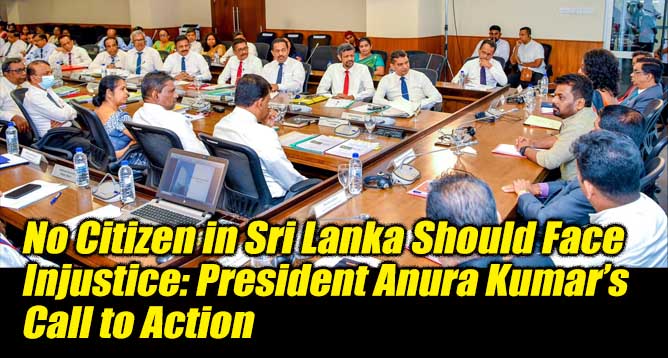-By Presidential affairs correspondent

(Lanka-e-News -22.Dec.2024, 11.40 PM) President Anura Kumara’s recent address to government servants struck a chord with citizens and public servants alike, as he reaffirmed his administration’s commitment to eradicating injustice in Sri Lanka. Speaking to an audience of civil servants, the President emphasized the role of public employees in shaping the nation’s future and addressing long-standing issues of poverty, inequality, and inefficiency.
The President’s speech was a rallying cry, blending accountability with inspiration. He underscored a core truth: most government employees are products of Sri Lanka’s free education system, funded by hardworking taxpayers. Therefore, they carry a moral and professional obligation to serve those who funded their education—the people of Sri Lanka, particularly those in rural and underserved areas.
President Kumara reminded his audience that the National People's Power (NPP) government came to power with an overwhelming mandate from the people, including a significant number of public servants who supported the party’s vision. This mandate, he said, is not just a license to govern but a binding contract to fulfill election promises.
One of the central themes of his speech was the need for government servants to align their efforts with the administration's priorities: poverty alleviation, digital transformation, and economic prosperity. These goals, the President stressed, cannot be achieved without the full cooperation of public servants, whose efficiency and dedication directly impact the government’s ability to deliver on its promises.
Addressing poverty, President Kumara emphasized that it is not merely about hunger or lack of resources but also about societal stigma. In Sri Lanka, poor people are often marginalized and assigned a low status, creating layers of inequality within the social fabric.
“To uplift the lives of the poor, we must address more than their immediate needs,” the President said. “We need to dismantle the social structures that confine them to the lowest layers of society. This involves providing them with opportunities, education, and a sense of dignity.”
He outlined the government’s strategy to prioritize the upliftment of underprivileged communities, focusing on access to quality education, healthcare, and job opportunities. The goal, he said, is not merely to meet basic needs but to empower individuals to break free from the cycle of poverty.
A cornerstone of the NPP government’s vision is digitalization, which President Kumara described as a transformative force for Sri Lanka. Digitalization, he argued, will streamline government services, reduce bureaucracy, and increase accessibility for all citizens.
The government plans to introduce digital identification systems, enabling citizens to access services more efficiently. From resolving disputes at police stations to accessing healthcare and education, digital platforms will simplify processes that have traditionally been mired in red tape.
“Large administrative buildings and unnecessary physical infrastructure will become relics of the past,” the President declared. “Instead, we will focus our investments on roads, energy, schools, hospitals, and universities—areas that directly impact the lives of our people.”
However, the success of this digital revolution hinges on the support and active participation of government servants. The President called on public employees to embrace digital tools and work proactively to ensure a smooth transition.
A recurring theme in the President’s speech was the need for increased productivity and accountability within the public sector. He criticized the tendency of some administrations to waste their term in office without delivering tangible results, leaving citizens frustrated and disillusioned.
“This government will not fall into the trap of inaction,” President Kumara vowed. “We have a clear action plan and a roadmap to address the problems of our people. But for this to succeed, public servants must work hand-in-hand with us.”
He stressed that civil servants are the bridge between the government and the people. Their efficiency, or lack thereof, directly affects public perception and the government’s ability to implement its policies.
The President’s address was more than a speech—it was a call to action. He urged government servants to see their roles as a duty to the nation and to remember that their positions are a privilege funded by the sacrifices of ordinary citizens.
He highlighted the plight of rural communities, many of whom face neglect and systemic barriers. “These villages need attention,” he said. “Their issues must be addressed. Public servants have a responsibility to be the voice of these communities and to ensure that government programs reach them effectively.”
President Kumara’s vision for Sri Lanka is ambitious but achievable, provided there is a collective effort from all stakeholders. His focus on poverty alleviation, digitalization, and economic prosperity reflects a deep understanding of the country’s challenges and a determination to overcome them.
However, the road ahead is not without obstacles. Resistance to change, inefficiency in the public sector, and deeply entrenched social inequalities are significant hurdles. The success of the NPP government’s initiatives will depend on its ability to address these challenges head-on while maintaining public trust.
President Anura Kumara’s address serves as a reminder of the transformative power of good governance. By holding public servants accountable and prioritizing the needs of the most vulnerable, his administration aims to build a more just and equitable Sri Lanka.
As the President aptly put it, “No citizen in Sri Lanka should face injustice.” These words must now translate into action, with every public servant playing their part in turning this vision into reality. For the people of Sri Lanka, the promise of justice, equality, and prosperity is not just a political slogan—it is a future worth striving for.
Relevant Video as follows
---------------------------
by (2024-12-22 22:50:41)
Leave a Reply